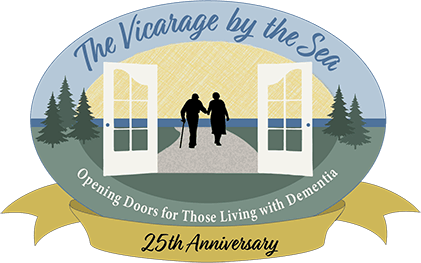"The Vicarage After 25 Years" Video Transcript
Hello, my name is Cheryl Golek, and I’m one of the founders of Vicarage By The Sea. And I’m Johanna Wigg, and I’m the other founder of Vicarage By The Sea. We are celebrating, in 2023, our 25th anniversary.We’re so proud of many accomplishments that we’ve had.
Twenty five years ago there was no alternatives to locked facilities to care for people living with dementia. We wanted to create a difference for that population and create a more home-style of care.
I’m a sociologist by training and so I was just fascinated by the neurology of the illness as well as the process in which the social world around my grandmother grappled with her dementia, both with her family, her friends, and then the surrounding world.
That experience drew both of us into a call to really create social change in our culture. As Cheryl mentioned, the options available for long-term dementia care 25 years ago were locked facilities and family care. And we all know that families get very fatigued in long-term care.
We had an opportunity to take what originally was a bed and breakfast and turn it into long-term care for those living with dementia and we incorporated a number of philosophies when we did that. William Thomas’s ‘Eden Alternative’, Thomas Kitwood from the UK’s vision of person-centered care for folks living with dementia which 25 years ago was very radical.
Having an unlocked facility was like the cool part of what we were going to do. And in order to do that we had to make sure we had enough staff to resident ratio.And by allowing people to just come and go as they choose, with staff guidance or just walking with them and enjoying the natural world around them, the amazing thing that happened within the first couple of years that we were open we started seeing right away is how dramatically people’s moods improved and medications dropped to half and to nothing.
To commit to the care of people with dementia requires a lot of energy and a lot of support, and so 25 years later we have a robust business. We’ve employed fantastic staff, all of whom come to us with unique backgrounds and have their nique in the care that they’re providing to the residents.
We feel, I think, very much like a family. It’s an intimate, small environment. While we’ve grown more now at a capacity of 12 residents, the feeling is still very intimate, very family oriented.
Another unique aspect, I think, of our model that sets us apart is the medical paradigm that we utilize. Less is more is our mantra. So, less medication, less western medical intervention, a simpler more holistic approach. Many people have ‘do not resuscitate’ orders and are looking for a gentle palliative model of care for their time with us and I think we provide a beautiful model for that type of long-term care for folks living with dementia. We utilize western medicine for what they do best, which is care for a fall and a broken hip, or something like that and we become very palliative in the care we’re providing outside of that sort of western medical intervention. It works really well for the families and the folks that we’re caring for.
We live here. So the care for the residents, you know, we’ve participated in 24-7. And raised children here. I have two adult children in their early 30’s who were raised here. Now there’s two younger children who are being raised here. So when we say a family style of care, it really is. It functions like a home and I think that’s really unique to have. And, you know, we’ve allowed people from day one to bring their personal belongings, decorate their own rooms, and bring their cherished pets with them. Pets, at any age in life, are part of your family and when you get to an older age in life, having to leave your home and everything and having to leave a family member behind or lose it it traumatic, so it’s just all rolled into the style of care that we provide here and I think it’s just generally respecting each person as an individual.
It is beautiful to watch people come and settle in, when they make a transition to live with us and settle in and explore the grounds…take a walk down to the ocean, walk onto the dock, feel the movement of the ocean.
We wanted to make sure that everyone had access to the natural world around us. So one of the things that we’ve done over 25 years, it was probably close to 8 or 10 years into incorporating this business, was to create a freedom trail, which is a winding trail that comes down from the woods to where we’re sitting right now. What that does is that it also allows our residents free, unfenced-in space that they can move in,
This kind of quality care can happen, and it can happen all over our country. It just requires us to redefine how we value the people that are aging in our culture and what we feel they deserve and how we’ll give that care to them, which again is part of why Cheryl and I have committed our lives for this long to this project.
